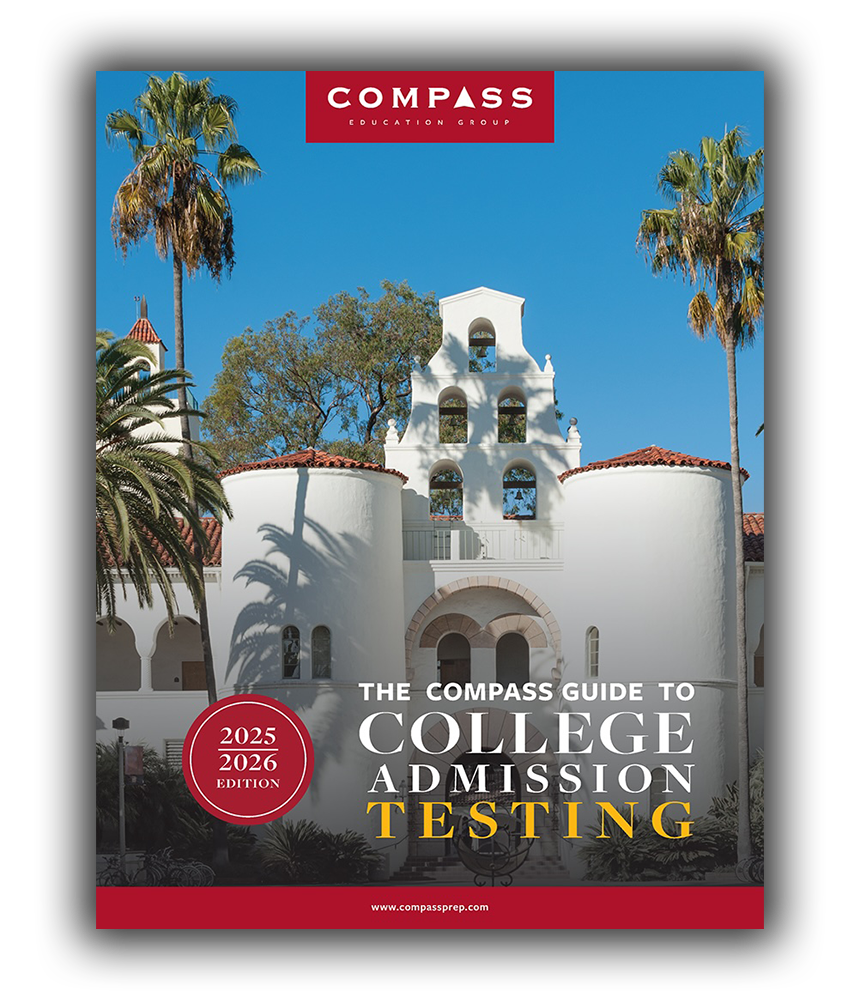Compass offers students the opportunity to practice on a digital exam platform (ACT, PSAT, SAT) or with a paper-and-pencil test booklet (ACT) and receive detailed feedback on performance. These are not official practice tests created by the testing agencies (College Board or ACT). Your school will give you specific information about how to register if you have not already done so.
What You Will Need for Your Test
- Pencil & scratch paper if testing online
- Calculator
- ACT Calculator Policy
- PSAT and SAT Calculator Policy
- Please note: Our digital test does not have an integrated calculator. However, you are able to use the online calculator from Desmos in another browser while taking your test.
- Snacks and water
Paper-and-Pencil Testing (ACT)
If you are taking a paper-and-pencil test, you will receive the test when you arrive at your testing location.
Digital Testing (PSAT, SAT, ACT)
If you are taking a digital test, you will receive an email with a link to the test a week before the event begins. You will also receive a test ID that can be used to access your test at testing-center.compassprep.com.
Supported Devices: Laptops, desktop computers, Chromebooks, and iPads. The Compass Online Testing Center runs in a web browser. You do not need to download an app. Click here on the device you plan to use to make sure it will work on test day.
Internet Connection: You need a stable internet connection to take the test. If you lose internet, our system will try to reconnect. If it cannot reconnect, the test is paused and your place is saved in the browser’s memory. Once online again, you can return to your test via the link or testing code.
Troubleshooting: If you encounter an issue during your test, we recommend placing it in an emergency pause and consulting the troubleshooting guide. If problems persist, please contact tests@compassprep.com and support@compassprep.com and we will be happy to assist you during regular business hours.
Accommodations: The Compass Online Testing Center offers regular time, 50% extended time, and double time accommodations. You have the opportunity to confirm or change your timing accommodations at the start of the test. Once you’ve started, you cannot change. If you need assistance, please contact the office for a new test.
Finishing Early on Digital Tests: Students with regular time must use the entire time for each section. You cannot finish a section early. Student with extended time may finish early once the regular time limit has expired. See test-specific timing charts below.
Extra Equating Sections
In some cases, you may receive an extra 20-minute section that can be any subject on the test. We use these sections to ensure the accuracy of our scaling. On digital tests, the equating section time must finish completely in order to receive results; there is no skipping to the end.
Score Reports
In most cases, you will receive a notification email that your scores are ready the same day you complete your test. In some cases, this notification is delayed to align with school programming. The questions from digital tests are available via score report for 120 days from the completion of your test. Please contact the office if you need assistance.
Missed Tests
If you miss your school’s testing event or the testing window for a digital test, please see Make-Up Testing below.
ACT Testing
The ACT has undergone changes for the 2025-2026 school year. Click here for details about these updates.
ACT: A Linear Test
Whether you take the ACT as a paper-and-pencil or digital test, it remains a linear test. The difficulty of questions does not change as you take the test.
Sections and Length
| Section | Questions | Standard Time | +50% Extended Time | +100% Extended Time |
| English | 50 | 35 min | 52 min 30 sec | 70 min |
| Math | 45 | 50 min | 75 min | 100 min |
| Break | — | 15 min | 15 min | 1 day |
| Reading | 36 | 40 min | 60 min | 80 min |
| Science (Optional) | 40 | 40 min | 60 min | 80 min |
Note: For digital ACT practice tests, you may receive an additional 20-minute section of any subject at the end of your test.
How long should I set aside to test?
Standard Time: 3 hours and 30 minutes
+50% Extended Time: 4 hours and 30 minutes
+100% Extended Time: 6 hours split across 2 days
Available Test Formats
We offer the practice ACT as a paper-and-pencil and digital test. Your school will let you know which version of the test you are taking.
SAT & PSAT Testing
The PSAT and SAT are the same length. Click here for more information about PSAT scoring.
PSAT & SAT: Digital and Adaptive
The PSAT and SAT are digital and adaptive tests. They are only offered on computers* and are stage-adaptive.
There are two sections: Reading & Writing and Math. Each section has two stages in the following order: Reading & Writing Stage 1, Reading & Writing Stage 2, Break, Math Stage 1, Math Stage 2.
The first stage of each section is not adaptive (item difficulty will not “adapt” to a student’s performance) and it contains a full range of question difficulty.
At the end of the first stage, the test will choose which of the two remaining sets of questions is an appropriate level of difficulty: one module will be on average easier and the other module will be on average more difficult.
The SAT is not item-adaptive where every question varies based on performance. It is stage-adaptive. It will only adapt once for Reading & Writing and only once for Math. This lowers the stakes on any one question and also preserves the ability to go backward and forward within a stage.
For more information about the test, please click here.
*Some accommodations allow for a longer paper-based version of the test.
Sections and Length
| Section | Questions | Standard Time | +50% Extended Time | +100% Extended Time |
| Reading & Writing: Stage 1 | 27 | 32 min | 48 min | 64 min |
| Reading & Writing: Stage 2 | 27 | 32 min | 48 min | 64 min |
| Break | — | 10 min | 10 min* | 10 min* |
| Math: Stage 1 | 22 | 35 min | 52 min 30 sec | 70 min |
| Math: Stage 2 | 22 | 35 min | 52 min 30 sec | 70 min |
Note: you may receive an additional 20-minute section of any subject at the end of your test.
How long should I set aside to test?
Standard Time: 2 hours and 45 minutes
+50% Extended Time: 3 hours and 45 minutes (*Students testing with extended time may take two additional 5-minute breaks: between Reading/Writing Stages 1 & 2 and between Math Stages 1 & 2.)
+100% Extended Time: 5 hours (*Students testing with extended time may take two additional 5-minute breaks: between Reading/Writing Stages 1 & 2 and between Math Stages 1 & 2.)
Rescheduling and At-Home Practice Test Options
We partner with schools across the nation to offer practice test days for students. However, we understand those days don’t always work for a family’s schedule.
If you cannot attend on your school practice test administration date, please register for a FREE make-up practice test. You will receive an automatic email with testing instructions within 1-2 business days.
For make-up digital tests, students will have access for 2 weeks after registration. Please use the same registration information used for your school event (name, email, phone number); using different registration information may delay results notification. If your school event registration remains open, please register there before signing up for a make-up practice test (even if you don’t plan to join your school-day event).
If you would like to sign-up separately from your school for one of our regularly scheduled, in-person, fee-based, weekend sessions, please use the consultation registration below to make a reservation to speak with one of our Directors. You are also welcome to call us at (800) 685-6986.
We look forward to helping you with a practice test and discussing your results!
*In-person testing is only available in limited regions
Consultation
Schedule a consultation with a Compass Director
The members of our management team are leading experts in the field of admission testing. They personally lead every aspect of each student’s experience with Compass, including program recommendations, tutor selection, and ongoing guidance. We welcome you to schedule a call with us to review your student’s practice test results at no cost.
The Compass Resource Center
Download the latest version of…
The Compass Guide to College Admission Testing
…in our comprehensive Resource Center. Get answers to the most important questions, including:
- How competitive are your test scores?
- What is the most effective calendar for testing?
- How do the SAT and ACT compare?
- What are the implications of ‘test optional’ policies?
- How do you interpret PSAT scores?
- What do I need to know about the new digital adaptive SAT?



